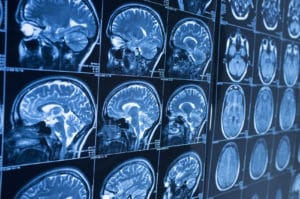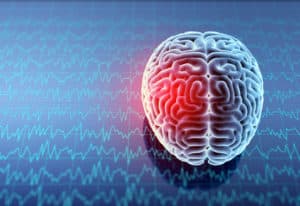
Doctors usually classify a concussion as a mild brain injury because it rarely causes death. But the symptoms you experience after a concussion could seem anything but mild.
One such symptom is amnesia. Memory loss occurring as a result of a concussion can range from a few lost memories surrounding the accident to ongoing or debilitating memory problems.
Read on to learn more about how and why you might suffer memory loss after a concussion, as well as what you can do about it.
Table of Contents
How Does Memory Work?

The brain contains highly specialized cells called neurons. Each neuron connects to many other neurons, creating a network of neural connections. Remembered experiences are stored in the connections between these neurons.
There are two basic forms of memory: short-term and long-term. Short-term memory is used for briefly holding information while the brain performs tasks. For example, you use short-term memory when attempting to navigate a location you’ve never been to before. Short-term memories typically only last a few minutes before you forget them.
By contrast, when you pick up new information or skills, that knowledge typically gets stored in long-term memory. Long-term memories can theoretically last forever, and they get stronger the more you use them. This explains why you get better at tasks like riding a bike or playing the piano with practice.
The process of forming memories takes place in two separate stages: encoding and retrieval.
Encoding
As you have a sensory experience, your brain makes a kind of record of it. It then encodes the information by forming a neural connection associated with that memory.
Retrieval
When you need to access a stored memory, your brain recalls it by finding and tracking the neural connections that store them. Stronger connections make recalling memories easier. If you access a certain piece of information over and over again, like your birthdate or Social Security number, you’ll be able to recall it more easily. Less-used information is stored in weaker connections, making it more difficult to recall.
What Happens During a Concussion
Brain injuries often happen when acceleration or deceleration causes your brain to shift violently inside your skull. With severe injuries like a cerebral contusion, your brain actually collides with the interior wall of the skull.
In a concussion, the brain sloshes around in the cerebrospinal fluid (CSF) inside your skull without striking the skull itself. This can happen when your body gets whipped around in a car accident or jolted in a slip and fall accident. The pressure of your CSF “squeezes” your brain, damaging cells. The damaged cells have trouble working properly, causing your brain to malfunction.
Your immune system then causes your brain to swell in response to the damage. Normally, inflammation prevents infections from spreading by cutting off blood flow to an injury. But in your brain, swelling causes the neurons to misfire, as they cannot get the blood they need.
How Concussions Affect the Brain
Your brain performs many important functions, including:
- Memory
- Thinking and judgment
- Collecting and interpreting sensory information
- Controlling your organs
- Moving your body
Concussions can hinder all these functions. Some of the most common symptoms of concussions include:
- Headache
- Blurry vision or seeing stars
- Tinnitus
- Confusion
- Clumsiness
- Fatigue
- Amnesia
What are the Different Types of Memory Loss?
The amnesia that frequently befalls concussion patients can take a few different forms.
Temporary Shutdown
Concussion patients often lose memories surrounding their accidents. This happens because the brain cannot encode information for a short period after receiving a jolt. You can think of this as a brief shutdown or overload at the instant of the injury. Any information you had in your brain right before the accident doesn’t make it into your memory.
As a result, you’re unable to remember your accident. Or, more accurately, there is no information about your accident for your brain to retrieve. Unfortunately, this means that those memories are probably lost forever. Even after you’ve fully recovered from the concussion, you won’t have any recollection of the precipitating event.
Post-Accident Trauma
Another explanation for memory loss following a concussion has more to do with the body’s emotional response to the accident than with any physical damage to the brain.
In the wake of a traumatic event, the brain protects itself by recalibrating its fight-or-flight response. It reasons that it suffered an injury because it was too lax in perceiving threats, and it reacts by increasing its sensitivity to new threats, leading to a condition referred to as post-traumatic stress disorder (PTSD).
PTSD makes you hyper-sensitive to anything that reminds you of your accident. This protects the brain from having to relive the trauma of the accident and makes it more alert to similar dangers, but one side effect is that the memories relating to your accident become suppressed.
In other words, the brain stores those memories but deliberately avoids recalling them. With time and therapeutic intervention, it’s possible to regain memories that trauma has rendered inaccessible.
Permanent Brain Damage
Occasionally, people who are involved in accidents suffer permanent brain damage to the areas of the brain responsible for encoding or recall. Severe damage of this sort prevents the brain from processing memories normally. People who experience it lose the ability to encode new memories, retrieve recent and older memories, or both.
Permanent brain damage can prevent you from learning new skills or information. Consequently, it could interfere with your ability to perform routine activities like driving, shopping, or cooking. You could also find that your options for employment become limited.
Don’t Lose More Than Your Memory — Contact an Attorney
If you’ve been injured due to someone else’s negligence, you might be eligible for compensation for the resulting damages. After all, concussions frequently require hospitalization, medical testing, and treatment for initial symptoms. In some cases, long-term physical therapy might also be required to deal with more pervasive symptoms.
Doctors may be able to help these conditions, but they cannot heal your wallet. The compensation you stand to be awarded for concussion-related amnesia depends on the extent and duration of your memory loss. Contact Hollander Law Firm Accident Injury Lawyers to schedule a free consultation online or call at (561) 347-7770 to talk with one of our expert accident lawyers and find out how we can help get your life back on track.
